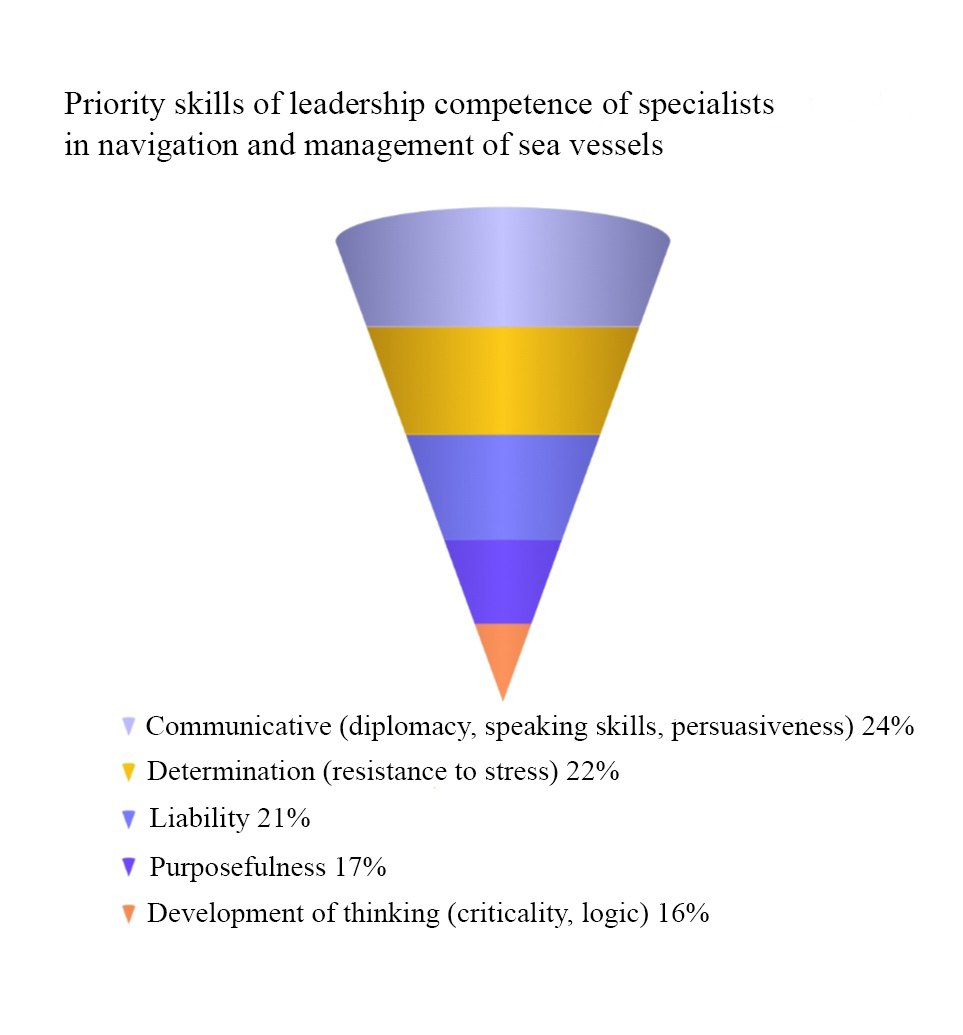The importance of communication skills in the formation of leadership competence of future specialists in navigation and management of ships
DOI:
https://doi.org/10.15587/2519-4984.2023.291442Keywords:
leadership competence, communication skills, leader, leadership, navigation and ship managementAbstract
The article analyses the content of leadership competence and substantiates the need for communication skills for the professional activity of future specialists in ship navigation and ship handling. It is determined that the formation of leadership competence is aimed not only at achieving personal success, but also at ensuring the safety of crew members and strengthening the mental health and well-being of seafarers. The study has shown that the priorities in the development of leadership competence are communication skills (diplomacy, developed oratory skills, persuasiveness); determination (stress resistance); responsibility and dedication; development of thinking (speed, logic, criticality). The necessity of improving the «soft» skills of seafarers is actualised, which is possible through the introduction of the author's special course and active forms of work in the educational process of higher education institutions, aimed at developing leadership competence in specialists in ship navigation and ship management. It is substantiated that the leader's communication skills can be useful for the following purposes: improving crew morale, increasing the productivity of professional duties and facilitating internal communication. It is established that the formation of leadership competence involves taking into account individual psychological characteristics in the process of formation, high self-esteem, positive attitude, cognitive activity, emotional stability, courage, self-control, communication and organisational skills and systematic creation of situations. The prospects for the development of communication skills are to improve the maritime education system at all levels and to provide conditions for the development of leadership competence of future officers
References
- Bespartochna, O., Poyasok, T. (2021). Formation of leadership qualities in future psychologists. Pedagogy of the Formation of a Creative Person in Higher and Secondary Schools, 78, 155–160. doi: https://doi.org/10.32840/1992-5786.2021.78.27
- Tiurina, V. O. (2020). Leadership competence and determining the level of its formation in cadets as future police officers. Innovate Pedagogy, 3 (20), 90–92. doi: https://doi.org/10.32843/2663-6085-2020-20-3-19
- Koshil, O., Spirina, T. (2023). Features of leadership qualities formation of students in the conditions of professional college. Vvichlyvist. Humanitas, 3, 47–52. doi: https://doi.org/10.32782/humanitas/2023.3.6
- Fendo, O. (2022). Soft skills: development of flexible skills of management specialists. Actual Problems in the System of Education: General Secondary Education Institution – Pre-University Training – Higher Education Institution, 1 (2), 816–824. doi: https://doi.org/10.18372/2786-5487.1.16672
- Haidarzhy, A. I. (2021). Influence of leadership on forming and development of organizational culture of navigators. Naukovi zapysky, 144, 31–37. doi: https://doi.org/10.31392/nz-npu-144.2019.04
- Didenko, O., Kostiuchenko, M. (2022). Leadership competence as a subject of scientific research. Collection of scientific works of the National Academy of the State Border Guard Service of Ukraine. Series: Pedagogical Sciences, 29 (2), 208–221. doi: https://doi.org/10.32453/pedzbirnyk.v29i2.1046
- Bezlutska, O. (2019). Leadership as a basis of maritime officer’s successful management. Aktualni pytannia humanitarnykh nauk, 25, 172–176. doi: https://doi.org/10.24919/2308-4863.0/25.178968
- Mizhnarodna konventsiia pro pidhotovku i dyplomuvannia moriakiv ta nesennia vakhty 1978 roku. Available at: https://zakon.rada.gov.ua/laws/show/995_053#Text.
- Shvetsova, I. V. (2016). Kultura osobystisnoho samostverdzhennia menedzhera osvitnoi haluzi. Pidhotovka menedzheriv osvitnoi haluzi v umovakh detsentralizatsii upravlinskykh struktur: svitovyi dosvid. Kherson, 192–195.
- Lord, R. G., Hall, R. J. (1992). Contemporary views of leadership and individual differences. The Leadership Quarterly, 3 (2), 137–157. doi: https://doi.org/10.1016/1048-9843(92)90030-j
- IMO Model Course 1.39 Leadership and Teamwork. London: IMO. https://www.scribd.com/document/437237373/Model-Course-1-39-Leadership-Teamwork
- Huzar, O. (2016). Komunikatyvne liderstvo kerivnykiv osvitnikh zakladiv. Kyiv: DP «NVTs «Priorytety», 40.
- McWilliams, J. (2022). What life at sea can teach you about leadershi. Available at: https://this.deakin.edu.au/study/what-life-at-sea-can-teach-you-about-leadership
- Leadership and Managerial Skills. Mitags. Available at: https://www.mitags.org/leadership-courses/

Downloads
Published
How to Cite
Issue
Section
License
Copyright (c) 2023 Iryna Shvetsova

This work is licensed under a Creative Commons Attribution 4.0 International License.
Our journal abides by the Creative Commons CC BY copyright rights and permissions for open access journals.
Authors, who are published in this journal, agree to the following conditions:
1. The authors reserve the right to authorship of the work and pass the first publication right of this work to the journal under the terms of a Creative Commons CC BY, which allows others to freely distribute the published research with the obligatory reference to the authors of the original work and the first publication of the work in this journal.
2. The authors have the right to conclude separate supplement agreements that relate to non-exclusive work distribution in the form in which it has been published by the journal (for example, to upload the work to the online storage of the journal or publish it as part of a monograph), provided that the reference to the first publication of the work in this journal is included.






